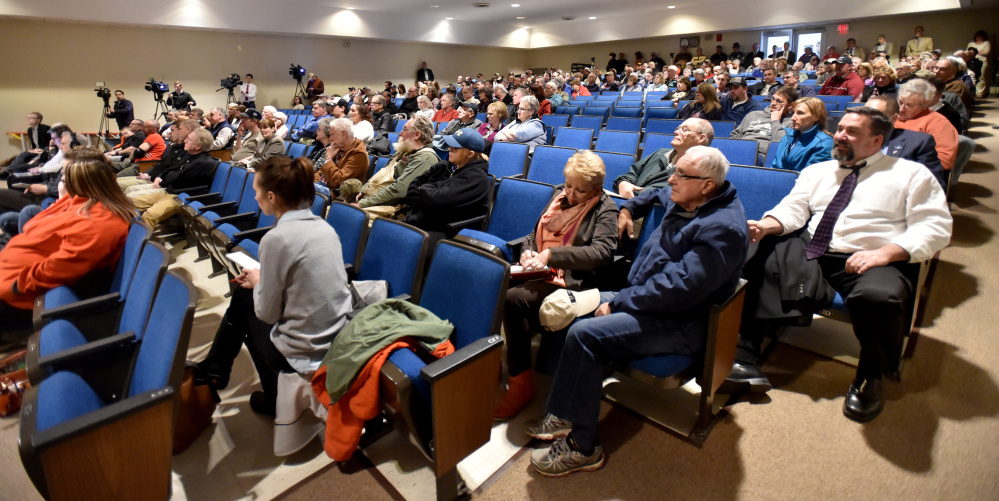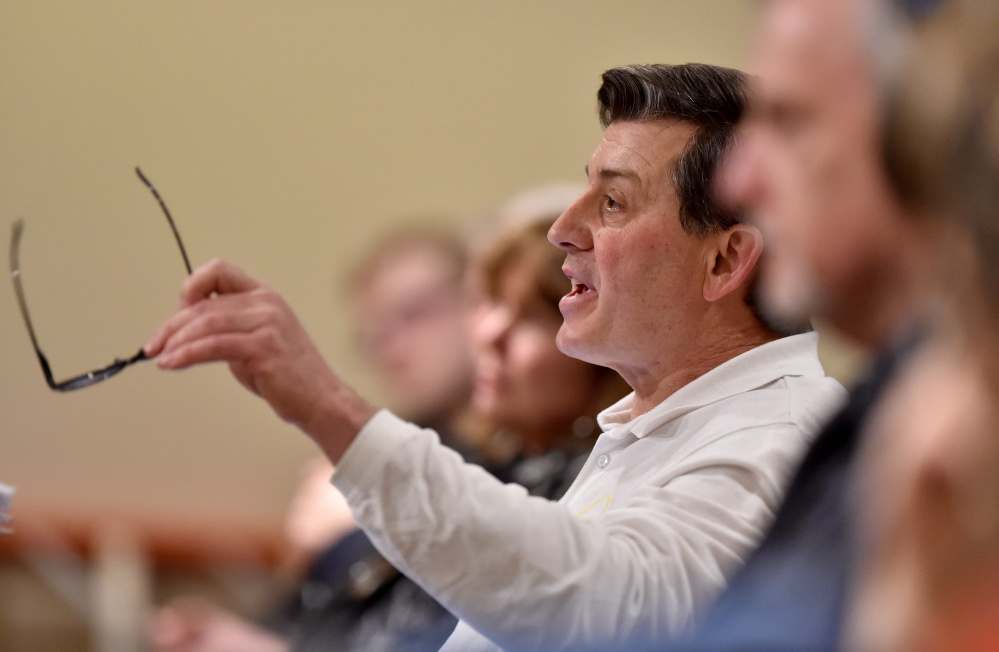MADISON — Gov. Paul LePage reiterated his message that voters need to elect candidates who will support their interests in Augusta on Wednesday night at a town hall-style meeting where many questions focused on the recent announcement that the Madison Paper Industries mill will close in May.
“You need to demand that the candidates you put in office work for you,” LePage said, echoing similar messages that he delivered last week to residents in Mexico and Waterville. “Whether you like it or not, you need a few more like me who are willing to speak out rather than let the state be taken over.”
Earlier this month, Madison Paper Industries, the town’s largest taxpayer and one of its largest employers, announced it will be closing in May, citing a decline in demand for the supercalendered paper the mill produces. Many of the questions asked Wednesday night focused on the mill’s closure and the future of the town, including the likelihood of finding a buyer for the mill and legislation that would provide tax relief in Madison.
“The last thing I want to see is UPM leaving,” LePage told the audience of about 200 people at Madison Area Junior High School. “If that meant going to Finland (where the company is based), I would get on a plane tomorrow.”
The Madison mill is the fifth in the state to close in the last two years, and LePage said it is critical that communities and state lawmakers work with businesses including the remaining mills in the state to keep them in Maine.
That includes working with mills to make sure they are assessed and taxed at the right rates, he said. In Madison, where the town lowered the mill’s assessment in 2014 by about $150 million, LePage said “people have been very reasonable and worked to get the assessment down.”
“I commend you and you will be rewarded. The state will work with you,” he said. “But it’s very difficult if you go into a plant and it has a valuation that is totally irresponsible.”
Shawn Bean, who works at Sappi Fine Paper in Skowhegan, asked LePage whether there is anything the state can do to keep infrastructure of closing mills such as Madison’s in place.
The state might not be able to regulate what mills do with their assets, LePage said, but the state can do other things to work with mills that are still in operation.
He said he has had or plans to have discussions with mill operators in Madison, Jay and Rumford about the recent tariffs placed on paper imported from Canada that could hurt some Maine mill companies.
“It’s important we sit down and try and work something out so people and their communities don’t get devastated,” he said.
Several times throughout the meeting, LePage also brought up the need to reduce energy costs to create a more business-friendly operating environment.

Audience members listen to Gov. Paul LePage on Tuesday during a town hall-style event at Madison Area Junior High School in Madison.
Still, House Majority Leader Jeff McCabe, D-Skowhegan, called Wednesday’s meeting a “missed opportunity” for the governor to present a vision for Madison and how the community can move forward. McCabe, whose district includes part of Madison, sponsored a bill last year, now being reconsidered in the Legislature, that would provide additional school funding to communities such as Madison that have experienced a large drop in tax value.
“I think a lot of people were looking for more of a commitment or a vision for the town,” McCabe said of Wednesday’s meeting. “I think the Department of Labor is doing an outstanding job of helping people, but I think there are other options and resources we can also be looking at.”
Ideas include creating a task force or directing additional state resources to Madison, or investing in the state’s biomass industry, which is also struggling and the loss of which, like the paper mill closures, would harm the forest products industry, McCabe said.
In response to a question from Summer Libby, a Madison Area Memorial High School senior, about the future viability of the town, LePage said Madison needs to find a way to reinvent itself, but that the most important thing residents can do is elect officials who will support business.
“I think Maine has a great future if you pay attention and when you go to the polls in November you elect people who are pro-business,” he said.
While the town is still figuring out what it can do to reinvent itself after the mill closes, it was helpful for LePage to show his support Wednesday night, said Vice Chairman of the Madison Board of Selectmen Jack Ducharme.
“Certainly we have to figure out how to do this and we do have to figure out what we want to be,” he said. “But Madison is a great place to live and work. I’ve chosen to live here for years and I’ll continue to live here, because it’s a nice place to be.”
Rachel Ohm — 612-2368
Twitter: @rachel_ohm
Send questions/comments to the editors.











Comments are no longer available on this story